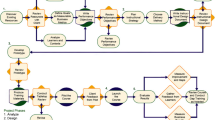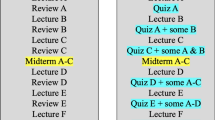Abstract
This study reports on an attempt to improve the quality of student learning by integrating an Approaches to Learning programme, consisting of 8 workshops, into the first year Psychology curriculum. Written accounts of students' conceptions of learning were collected at the beginning and end of the programme. Content analysis showed that there was a significant shift from naive to more sophisticated conceptions (29% to 60%) in students who had attended more than half the workshops, by the end of the programme. The programme also showed several significant benefits on students' academic performance. Students who attended all the workshops on essay writing and examination taking, obtained higher essay and examination marks than students who did not attend these workshops.
However, when we looked at the effects on academic performance of taking a deep approach and holding a more sophisticated conception of learning, the findings were not so clear cut. Depending on the measure used, there was conflicting evidence about whether examination performance or essay performance benefitted the most. The implications of these results are discussed with particular reference to the role of assessment, in enhancing the quality of student learning.
Similar content being viewed by others
References
Beckwith, J.B. (1991). ‘Approaches to learning, their context and relationship to assessment performance’,Higher Education, 22, 17–30.
Bergenhenegouwen, G. (1987). ‘Hidden curriculum in the university’,Higher Education, 16, 535–543.
Biggs, J.B. (1987).Student approaches to learning and studying. Hawthorne, Victoria: Australian Council for Educational Research.
Biggs, J.B. (1988). ‘The role of metacognition in enhancing learning’,Australian Journal of Education 32(2), 127–138.
Boud, D. (1990). ‘Assessment and the promotion of academic values’,Studies in Higher Education 15(1), 101–110.
Cloete, N. and Shochet, I. (1986). ‘Alternatives to the behavioural technicist conception of study skills’,Higher Education 15, 247–258.
Eley, M.G. (1992). ‘Differential adoption of study approaches within individual students’,Higher Education 23, 231–254.
Entwistle, N.J. (1984). ‘Contrasting perspectives on learning’, in Marton, F. et al. (eds.),The experience of learning. Edinburgh: Scottish Academic Press.
Entwistle, N.J. (1987). ‘A model of teaching-learning process’, in Richardson, J.T.E., Eysenck, M.W., and Warren Piper, D. (eds.),Student Learning: Research into Education and Cognitive Psychology. Milton Keynes: Open University Press.
Gibbs, G. (1992).Improving the Quality of Student Learning, Bristol: Technical and Educational Services.
Klein, J.D., and Freitag, E.T. (1992). ‘Training students to utilise self-motivational strategies’,Educational Technology 32 (3), 44–48.
Larsen, K. (1992). ‘Motivation, styles of learning, and approaches to learning of students, in higher education’, Unpublished undergraduate research project: Liverpool Institute of Higher Education.
Martin, E. and Ramsden, P. (1987). ‘Learning skills, or skill in learning?’ in Richardson, J.T.E., Eysenck, M.W. and Warren Piper, D. (eds.),Student Learning: Research into Education and Cognitive Psychology. Milton Keynes: Open University Press.
Marton, F., Dall'Alba, G. and Beaty, E. (1993). ‘Conceptions of learning’,International Journal of Educational Research 19, 277–300.
Marton, F. and Saljo, R. (1976). ‘On qualitative differences in learning: I: Outcome and process’,British Journal of Educational Psychology 46, 4–11.
Marton, F. and Svensson, L. (1979). ‘Conceptions of research in student learning’,Higher Education 8, 471–486.
Meyer, J.H.F. (1991). ‘Study orchestration: the manifestation, interpretation, and consequences of contextualised approaches to studying’,Higher Education 22 (3), 297–316.
Norton, L.S. (1981). ‘The effects, of note-taking and subsequent use on long term recall’,Programmed Learning and Educational Technology 18 (1), 16–22.
Norton, L.S. (1990). ‘Essay-writing: What really counts?’,Higher Education 20, 411–442.
Norton, L.S. and Hartley, J. (1986). ‘What factors contribute to good examination marks? The role of note-taking in subsequent examination performance’,Higher Education 15, 355–371.
Perry, W.G. (1970).Forms of Intellectual and Ethical Development in the College Years: A Scheme. New York: Holt, Rinehart and Winston.
Ramsden, P., Beswick, D., and Bowden, J. (1987). ‘Learning Processes and Learning skills’. in Richardson, J.T.E., Eysenck, M.W., and Warren Piper, D. (eds.),Student Learning: Research into Education and Cognitive Psychology. Milton Keynes: Open University Press.
Saljo, R. (1979). ‘Learning about learning’,Higher Education 8, 443–451.
Schmitt, M.C. (1988) ‘Are above average, college students, strategic learners and/or can they be taught to be? A case study’. Paper presented at the Annual Meeting of the National Reading Conference (38th Tucson, AZ, Nov 29–Dec 3, 1988).
Sherman, T.M. (1991). ‘Creating a disposition to learn: Promoting enduring effects from learning improvement programs’,Research and Teaching in Developmental Education 8(1), 37–47.
Siegel, S. and Castellan, N.J Jr. (1988).Nonparametric Statistics for the Behavioural Sciences. 2nd ed. London: McGraw Hill.
Van Rossum, E.J., Deijkers, R. and Hamer, R. (1985). ‘Students' learning conceptions and their interpretation of significant educational concepts’Higher Education 14, 617–641.
Van Rossum, E.J. and Schenck, S.M. (1984). ‘The relationship between learning conception, study strategy and learning outcome’,British Journal of Educational Psychology 54, 73–83.
Wade, S.E. and Reynolds, R.E. (1989). ‘Developing metacognitive awareness’,Journal of Reading 33(1), 6–14.
Wangerin, P.T. (1988). ‘Learning strategies for law students’,Albany Law Review 52(2), 471–528.
Weber, R.P. (1985).Basic content analysis. 2nd ed. Beverly Hills, California: Sage.
Zuber-Skerritt, O. (1987). ‘The integration of university student learning skills in undergraduate programmes’,Programmed Learning and Educational Technology 24(1), 62–70.
Author information
Authors and Affiliations
Rights and permissions
About this article
Cite this article
Norton, L.S., Crowley, C.M. Can students be helped to learn how to learn? An evaluation of an Approaches to Learning programme for first year degree students. High Educ 29, 307–328 (1995). https://doi.org/10.1007/BF01384496
Issue Date:
DOI: https://doi.org/10.1007/BF01384496




